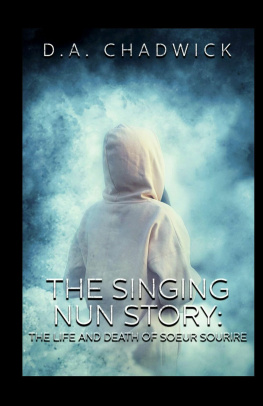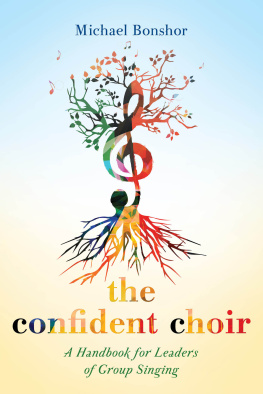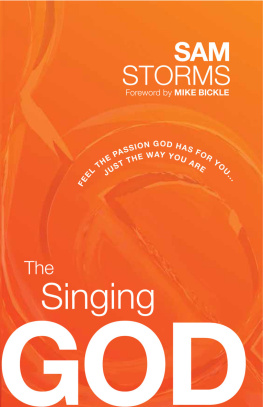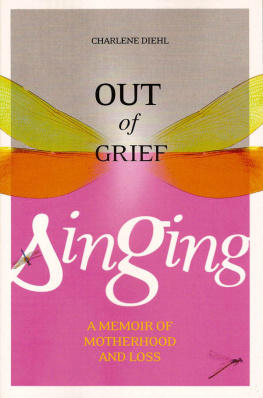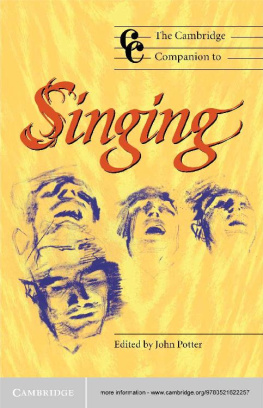ALSO BY STACY HORN
Unbelievable: Investigations into Ghosts, Poltergeists, Telepathy, and Other Unseen Phenomena from the Duke Parapsychology Laboratory
The Restless Sleep: Inside New York Citys Cold Case Squad
Waiting for My Cats to Die: A Morbid Memoir
Cyberville: Clicks, Culture and the Creation of an Online Town
Imperfect Harmony
Finding Happiness Singing with Others

STACY HORN

ALGONQUIN BOOKS OF CHAPEL HILL 2013
In Memory of Frank Cedric Smith
Thank you, and Dilys, for the music

CONTENTS
I believe in singing. I believe in singing together.
BRIAN ENO
PRELUDE
Anthracite is the most beautiful coal in the world. A coal car of anthracite emerging from the mines looks like a mountainful of dusty but sparkling black diamonds. It is also the hardest, densest, rarest, and most expensive coal in the world. When it burns, it burns blue, and if it catches fire underground its almost impossible to put out. An anthracite fire that began in Centralia, Pennsylvania, in 1962 continues to burn today.
On the morning of June 5, 1919, in Wilkes-Barre, ninety-two men died in one of the worst disasters in the anthracite mines of Pennsylvania. It happened quickly. The men were riding in a line of mine cars when sparks from a trolley wire or a miners lamp ignited twenty-four kegs of black blasting powder loaded in the rear. There was a roar, read a newspaper account, and in an instant every man and boy on the train was either dead or dying. Not long after that day, while scores of miners were still being treated for burns and amputated arms and legs, thirteen local men left their jobs in and around the mines and met at the Grant Street School, christened themselves the Orpheus Glee Club, and began to sing.
All the men in the Orpheus Glee Club were either miners or sons or brothers of miners. They also were mostly Welsh; for them, singing was how they celebrated and also how they grieved. James J. Davis, a Welshman who became the Secretary of Labor two years after the disaster, said in his autobiography, I think the reason I have never cared for drink is this: the ease from mental pain that other men have sought in alcohol, I always found in song.... The whole land of Wales echoes with the folk songs of a people who sing because they must.
I know that need. Ive been singing with the Choral Society of Grace Church in downtown New York since 1982. When Im standing up there with the choir, looking out at a thousand faces glowing in the incandescent light, singing some of the greatest music humanity has ever produced, I believe I know what made those miners sing. Its true that I didnt climb up out of a coal mine, but Ive lived half a century now and you dont live this long without knowing some of lifes sorrows. As long as Im singing, though, its as if Im inhabiting another reality. I become temporarily suspended in a world where everything bad is bearable, and everything good feels possible. Dont cry. Sing, a man with family fighting in Afghanistan tweeted recently. I do both.
Singing invariably and exquisitely triumphs over all my defenses; it has become a place where I still hope and still believe, and so I sometimes just lose it up there. Ill cry and cry with relief at the sheer joy of it all until vanity kicks in, when I realize my face must appear all twisted and funny because my lips are doing this weird quivering thing that I cant control. Can anyone in the audience see? Wait, damnit. Where were we? At that point Ive realized that I lost my place in the music. Damnit, damnit, damnit, damnit.
The director of our choir has exquisite taste in music, but he also invariably picks pieces that are described as so challenging that they are either rarely performed or attempted only by the most professional choirs. We are not a professional choir. We are a volunteer community choir. So while Im up there sobbing and thinking life is wonderful, the rest of the choir is racing ahead, executing some ridiculously difficult run. I try not to panic, to not look like Im panicking, but also to find a place to jump back in. Oh God, my nose is running. Where the hell are we?
In truth, I dont have a great voice. Those formidable runs we typically perform are especially demanding for me. But I practice night after night after night in order to keep up because I want to dwell in the world that singing reveals for as long and as often as I can.
This book is about that world and my almost thirty years with the Choral Society of Grace Church. It is also an eclectic history of group singing, conductors, pieces of music both famous and forgotten, the science of singing, and all the benefits that come from being in the middle of a song. Because for the past few decades, as boyfriends come and go, jobs come and go, cats live and die, a stay in a rehab when I was thirty, depression, broken engagements, and the deaths of those I love, there has always been this: The Choral Society of Grace Church. Once a week I return to one of the most beautiful churches in Manhattan, pick up whatever masterpiece were currently working on, open my mouth, and sing. Life is hard, battles of all kinds continue to rage around us, and disappointments accumulate. But singing is the one thing in my life that never fails to take me to where disenchantment is almost nonexistent and feeling good is pretty much guaranteed.
A German Requiem
Written by Johannes Brahms during 18651868
Performed by the Choral Society of Grace Church most recently in the Spring, 2010
To get to Grace Church, I walk east on Eleventh Street from Seventh Avenue to Broadway. Its a lovely walk that Ive taken more than a thousand times. Some city streets are gray or brown, but this particular stretch is a magical mystery tour of color, even at twilight. Nature and humanity have had a couple hundred years to settle into a luscious coexistence on these four blocks, and its like walking through a friendly forest that has been peacefully settled by people. In the spring and summer, boxes of brilliant flowers and strange plants crowd almost every apartment window, some with leaves so large they look tropical. Clover, wood-sorrel, crab grass, and violets sprout from the sidewalk cracks that are off to the side, and theres always a sweet perfume that comes from either wisteria, pine, or honeysuckle. Steam rises from the manholes like water escaping from a pot. Branches from each side of the street reach across, forming awnings overhead whose leaves sound like hundreds of tiny drums whenever it rains. In the winter, holiday decorations pick up where nature leaves off and the color comes from tasteful wreaths hanging on the windows and doors, and garlands of pine and Christmas lights winding down the wrought iron gates, railings, and balustrades.
Rehearsals are every Tuesday evening from 7:15 to 9:30, so this is a walk I take at night, when my view is lit by the moon, street lamps, and whatever light filters out from the first-floor parlor windows. Its a very wealthy part of town and it shows. Sometimes I feel like the Little Match Girl as I pass by, forever on the outside, catching glimpses through lace curtains of the enchanting lives in these small palaces of glimmering chandeliers, floor-to-ceiling bookcases, and grand pianos. In one window is a small, sad painting of a gerbil with lettering that reads: In memory of Mr. Pokey, 20012003. In another is Paddington Bear. For as long as I can remember that bear has stood in the window, looking out, his outfit regularly changing with the seasons. Its the beginning of January now, and hes dressed in a top hat and tails, as if hes been making the holiday party rounds.
Next page





